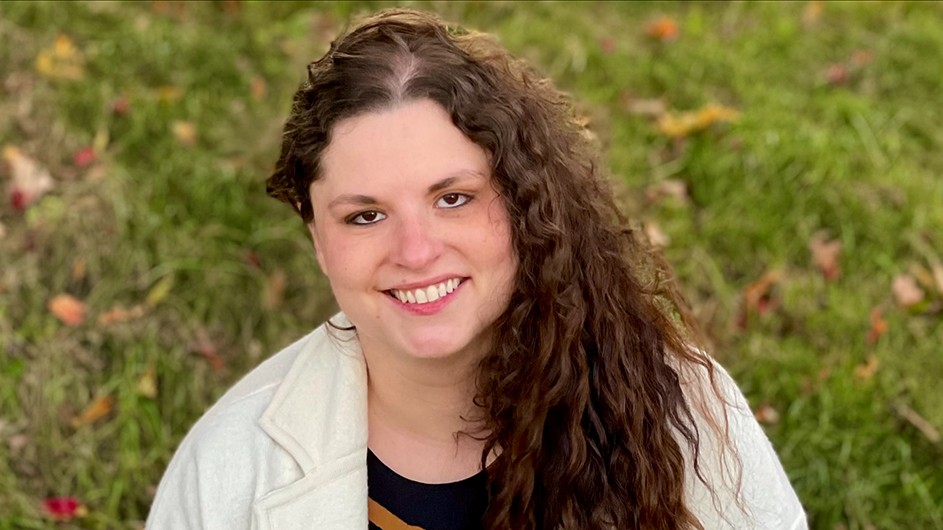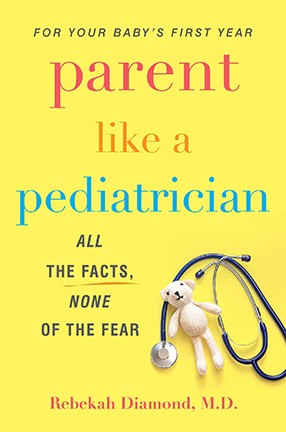How Do You Parent Like a Pediatrician?
Rebekah Diamond, a pediatrician and professor, provides guidance to parents on the right choices for their child's first year of life.

In Parent Like a Pediatrician, Dr. Rebekah Diamond, a pediatrician and professor of pediatrics at Columbia University Irving Medical Center/NewYork-Presbyterian Hospital—and a mother—provides expert guidance to new parents on making the right choices for the first 12 months of their child’s life.
With authoritative, up-to-date research and real-world advice on the myriad obstacles facing moms, dads, and caregivers, Diamond empowers the best parental instincts. From safe-sleep guidelines and breastfeeding to sensory developmental activities, baby products, and vaccinations, she helps parents navigate both the stressful and joyful early months of a baby’s life.
Diamond discusses her book with Columbia News, as well as how the pandemic has changed parenting, and why parents must balance their own needs with those of their children.
Why did you decide to write this book?
Even as a pediatrician, I was overwhelmed when my daughter was born. I struggled with both the everyday chaos of being an exhausted new parent, and some of the deeper pains of physical recovery, postpartum depression, and anxiety. At every turn, and with each new challenge, I was unable to find a source of guidance and support that didn’t make things more complicated, or give me more anxiety.
The official rules from my own pediatric organizations were scientific, but often rigid and unrealistic. The online, unofficial guidance was easier to follow, and designed to lessen new mom guilt, but as a pediatrician, I knew there was unsafe advice being doled out with a healthy dose of big-picture perspective. I needed a one-stop-shop source that gave me realistic, scientific, safe, and pediatrician-approved information. It didn’t exist, so I decided to write it!

With so many parenting books and other sources available, what makes yours truly distinctive, the one that parents should consult?
A major issue with today’s parenting advice is that it tends to come as one of two extremes—either guilt-free with no rules, or strict, one-size-fits-all, by-the-book instructions. Neither of these approaches makes sense. Parents feel they’re being told either that nothing matters, or that they’re doing things wrong unless they follow a rigid parenting recipe.
As a formerly super-overwhelmed and currently typically overwhelmed parent, I can appreciate the appeal of guilt-free parenting. When I was faced with a sea of online advice that said anything short of by-the-book parenting was wrong, guilt-free parenting posts appeared like lifeboats, telling me I was doing okay. While I love the sentiment that anything you do is great, the reality is that decisions matter, so knowing the range of realistic, scientific options helps parents make the best, safest choices possible.
I see a lot of parenting approaches based primarily on data, and I also appreciate the appeal of this type of guidance. But it’s impossible to simplify pediatric health in this way. Most people don’t realize how data-poor pediatric medicine is, meaning that we don’t have scientific studies for even a fraction of the issues we deal with. Pediatricians make a lot of decisions based on limited data, using common sense, biology, expertise, and, above all, the big-picture approach.
My book gives parents permission to follow their instincts and the guidance provided by their pediatricians to make choices that are right for them. Instead of prescribing particular parenting choices, I show moms and dads the safe range of options, and instill the confidence necessary to decide what works best for their family.
How do you think COVID has changed parenting, and what is the most important advice you can offer about raising children now?
I’m a hospital pediatrician, so the clinical work I do has definitely changed since COVID. But I've also seen huge ripple effects from the pandemic that involve all aspects of parenting. One example is the incredible surge in misinformation, which has led to a growing divide between parents and the medical establishment. It’s one of the reasons I wrote this book, and why I stay so active online: I’m here to meet parents where they are, and provide advice and support that is both safe and scientific, as well as relatable, attainable, and customizable.
I also help parents learn how to find trustworthy sources for reputable information, which is probably the key skill required to survive and thrive as a pandemic parent. I find that limiting your sources, and selecting a few reliable individuals or groups is an important first step.
Any other advice for new parents?
Parental health is the most important ingredient for childhood health, and we don't tell parents this enough. We live in a society—especially in the U.S.—that seems to be growing increasingly hostile to parents. In recent years, I’ve seen not only how we fail to give parents the support they need, but how we also convince parents that they must choose between their own health and that of their children.
Want what’s best for your newborn? Pump your breasts nonstop until your nipples bleed, no matter how hard society makes it to meet your breastfeeding goals. Need to sleep-train your baby so you can get enough rest to function tomorrow? Definitely do so.
The idea that parent and child health are mutually exclusive—or can even be disconnected—is one of the biggest lies of modern parenting. In almost every situation, declaring your own health and happiness as a priority will lead you to choices that benefit both you and your child. The notion that excess suffering can and should be avoided has revolutionized the advice I give—and how I parent. It’s what informs all of the guidance in my book, and I know it will help parents reach the same clarity and confidence that I now feel.
How do you balance the demands of parenting, teaching, and being a doctor, not to mention writing a book?
One day at a time! Some days I feel like I have it all down, and other days I'm just trying to make it through. The best part of writing this book has been learning to give myself permission to just do my best. I try to follow the advice I give parents—having unrealistic expectations of yourself, especially your parenting, is unfair and counterproductive. I have a lot of privilege and support, which means I've been able to accomplish a lot of goals with minimal sacrifice. But I also know that I can’t accomplish everything, and I'm learning to accept that.
What are you teaching this fall?
As a pediatric hospitalist in the Department of Pediatrics at CUIMC, my daily clinical work is supervising residents and medical students as they care for children who are admitted to NewYork-Presbyterian Hospital on the medical campus. It's work I truly love, and an amazing opportunity to teach pediatric trainees.
What's the best part of teaching at CUIMC?
The people, hands down! The students, staff, and my colleagues—everyone is committed to educating the next generation of pediatricians, and providing the absolute best care possible to patients and their families.